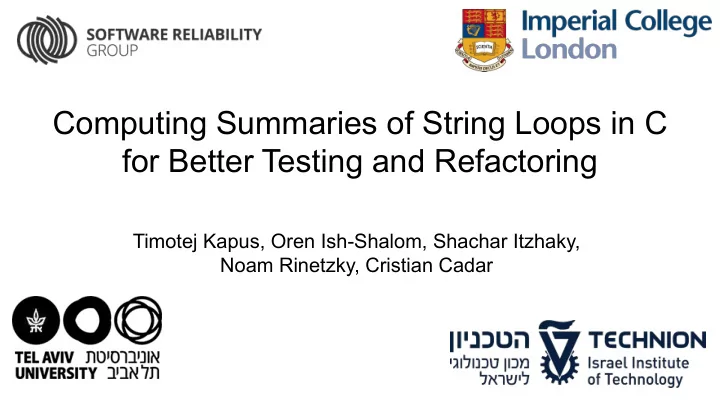

Computing Summaries of String Loops in C for Better Testing and Refactoring Timotej Kapus, Oren Ish-Shalom, Shachar Itzhaky, Noam Rinetzky, Cristian Cadar
2
This talk ␣ 3
Why? ● Give clarity to the meaning of loops ● Refactoring ● Program analysis ○ Symbolic execution ● Compiler optimisations 4
Motivation: Refactoring 5
Motivation: Refactoring summary 6
Motivation: Refactoring ● Real examples from and ● C code contains lots of loops replicating libc functions ○ Different handling of edge cases 7
Motivation: Program analysis ● Easier to reason about a known function than an arbitrary loop Example symbolic execution of Two approaches: 1. Unroll loop and gather constraints character by character 2. Model it as in theory of strings 8
Scope: Memoryless Loops ● Loops conforming to an interface: ○ Argument: single pointer to a buffer ○ Returns: pointer to an offset in the buffer ● Only reads the character under current pointer ● Need a vocabulary to express these loops 9
Remember? ␣ 10
In our vocabulary ␣ STRSPN_OPCODE ␣ DATA TERMINATOR RETURN_OPCODE Loop summary! 11
We just used characters! ␣ P \0 F ␣ STRSPN_OPCODE DATA TERMINATOR RETURN_OPCODE Loop summary! 12
Vocabulary for expressing simple loops ● Vocabulary has meaning in an ● and (F) ● Adding a new vocabulary as simple as adding a new 13
Vocabulary for expressing simple loops conditionals string.h functions pointer manipulation ● ● ● ● ● ● ● ● ● ● special ● ● ● 14
Loop Summarisation Find sequences of characters that when executed by our interpreter have the same behaviour as the original loop 15
Counter-example guided synthesis Generate a sequence of characters Loop to fitting all counterexamples summarize Synthesizer Verifier Success Done Fail - generate counterexample 16
Synthesizer Verifier ● Symbolic execution ● Symbolic execution ● Use a symbolic string (program) ○ Bounded equivalence ● Constrain it to be equivalent on checking strings of length ≤ 3 current counterexamples ● Loops in our scope ● Ask an SMT solver for a solution ○ checking lengths ≤ 3 sufficient to show equivalence for any length (proof in the paper) 17
Synthesizer Verifier ● Symbolic execution ● Symbolic execution ● Use a symbolic string (program) ○ Bounded equivalence ● Constrain it to be equivalent on checking strings of length ≤ 3 current counterexamples ● Loops in our scope ● Ask an SMT solver for a solution ○ checking lengths ≤ 3 sufficient to show equivalence for any length (proof in the paper) Single run of symbolic execution 18
Synthesizer Verifier CEX: [] 19
Program: F Synthesizer Verifier CEX: [] 20
Synthesizer Verifier CEX: [] Counterexample: ␣ 21
␣ Program: P ␣ F Synthesizer Verifier CEX: [ ␣ ] 22
␣ Synthesizer Verifier CEX: [ ␣ ] Counterexample: 23
␣ Program: P ␣ F Synthesizer Verifier CEX: [ ␣ ] 24
␣ Synthesizer Verifier Done! CEX: [ ␣ ] P ␣ F 25
Synthesis Evaluation ● 13 open source programs ● Semi-automatic process ● Extracted 115 loops fitting our scope ● In total 88/115 synthesised 26
2h/loop synthesis timeout: 77/115 loops 27
Impact of timeout and program size 28
Vocabulary optimisation ● Find a subset of vocabulary that Best performing vocabulary synthesises more loops ● ● Gaussian process optimization ● ● 5 minute timeout ● ● 81/115 loops with 5min timeout ● ● 7 additional loops found with full ● vocabulary and 2h timeout ● 88/115 total 29
Improving symbolic execution ● Use loop summaries to gather more efficient constraints ● Intercept calls to functions and encode them in theory of strings ● Compare with character by character constraints ○ Theory of strings should have an advantage for longer strings ● Implemented in KLEE ● Compared (only) on the loops we extracted 30
Improving symbolic execution 31
Improving symbolic execution 32
Compiler optimisation potential? ● Compare the loop summaries (libc library functions) with compiled loops 33
Refactoring ● Use summaries to create patches and send them to developers ● Developers of , and accepted the patches - for(; *tmp == ' ' || *tmp == '\t'; tmp++){ - } - for(; *tmp == '\n' || *tmp == '\r'; tmp++){ - } /* skip LWS */ + tmp += strspn(tmp, " \t"); + tmp += strspn(tmp, "\n\r"); 34
Conclusion ● Counterexample guided synthesis based technique for summarisation of simple loops in C ● 88/115 loops synthesized ● Applications: ○ Program analysis (symbolic execution) ○ Compiler optimisations ○ Refactoring 35
36
2h/loop synthesis timeout: 77/115 loops 37
Loops with a Loops without read from single utility Total loops Inner loops pointer call Read only loops pointer bash 1085 944 438 264 45 diff 186 140 60 40 14 gawk 608 502 210 105 17 git 2904 2598 725 495 108 grep 222 172 72 42 9 m4 328 286 126 78 12 make 334 262 129 102 13 patch 207 172 88 67 20 sed 125 104 35 19 1 ssh 604 544 227 84 12 tar 492 432 155 106 33 torture_test 100 95 39 30 25 wget 228 197 115 83 14 SUM 7423 6448 2419 1515 323 38
Has Goto 2 IOsideeffects 3 Non Pointer Return 74 Return In Loop 70 Too Many Arguments 28 Too Many Return Values 31 SUM 208 39
Impact of timeout and program size - 30s timeout 40
Impact of timeout and program size 41
Impact of timeout and program size 42
Recommend
More recommend